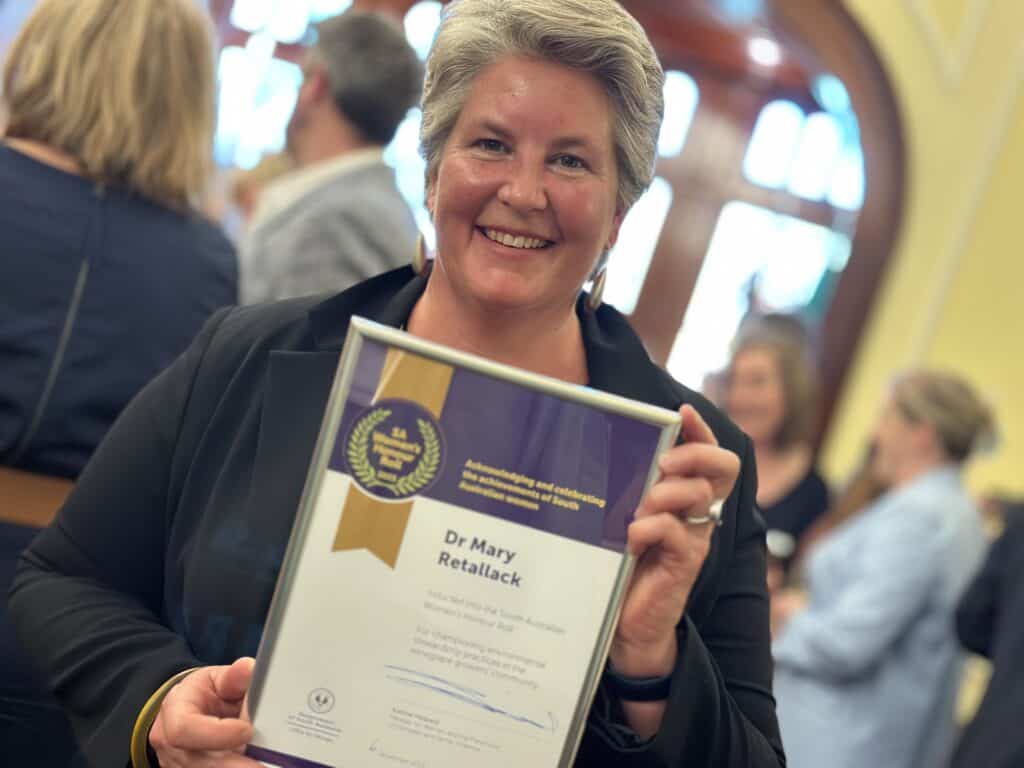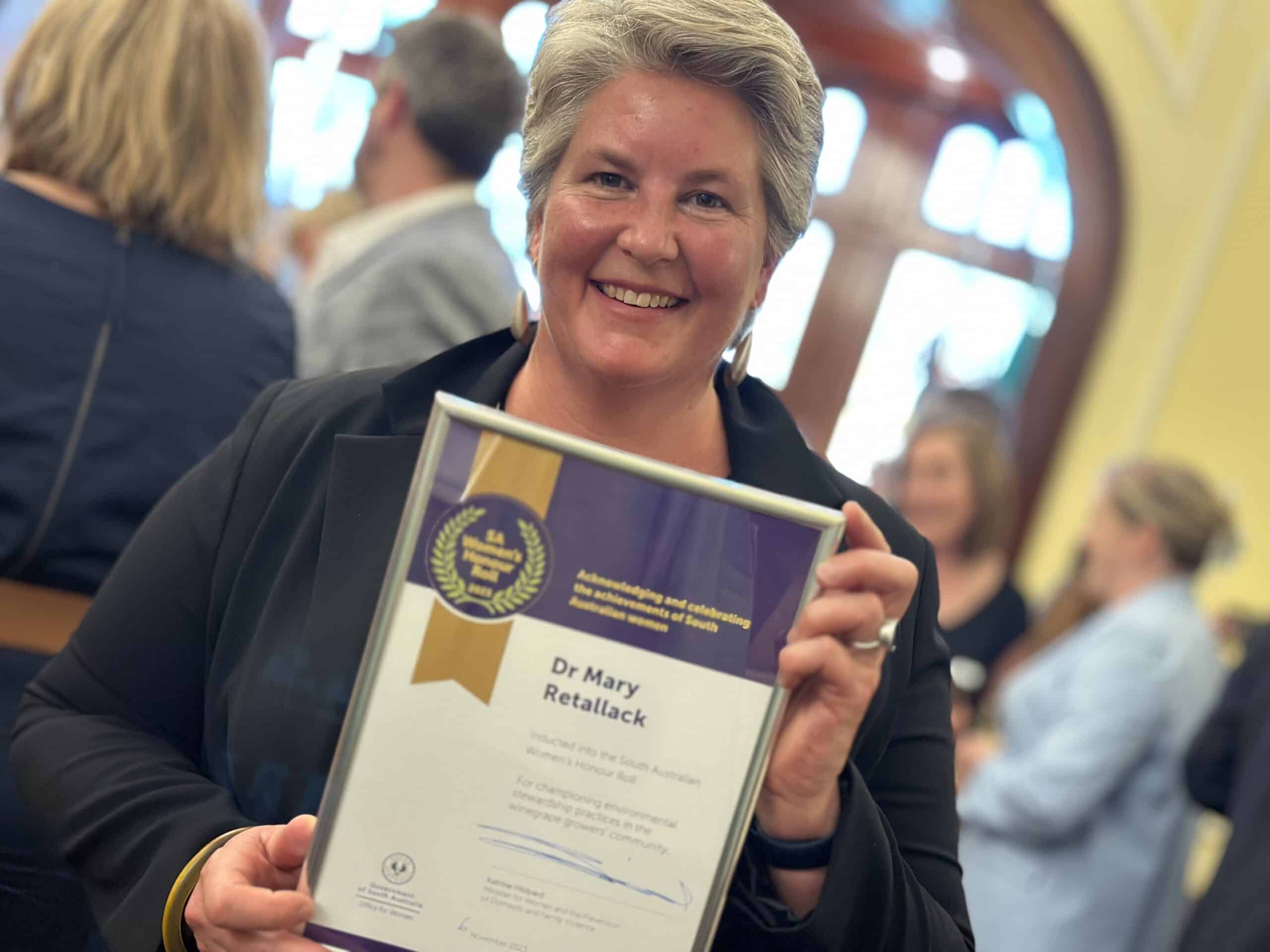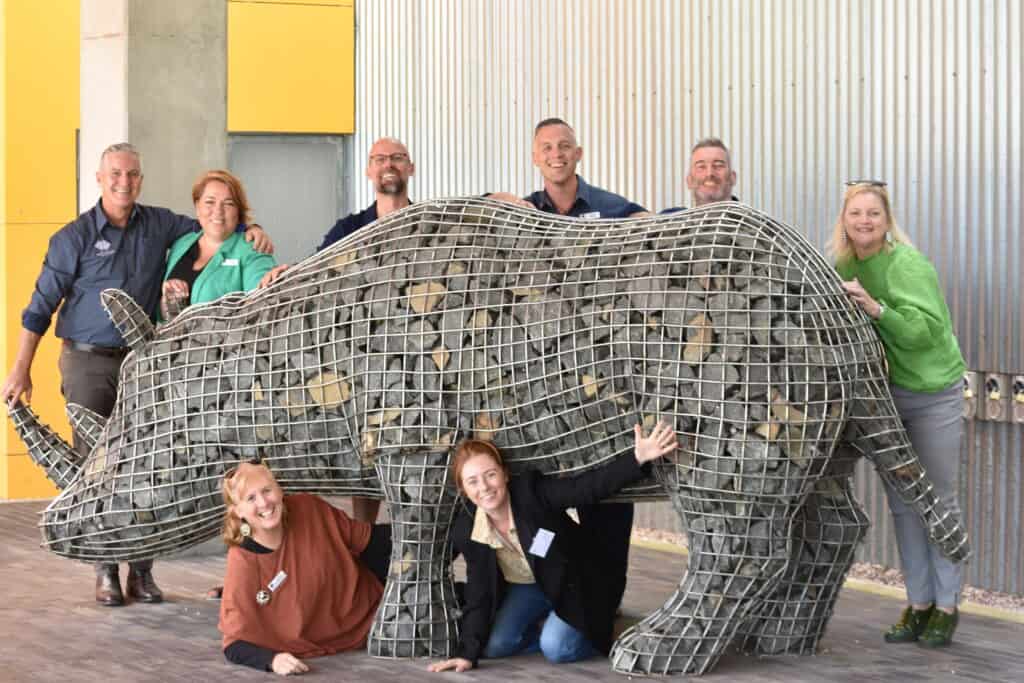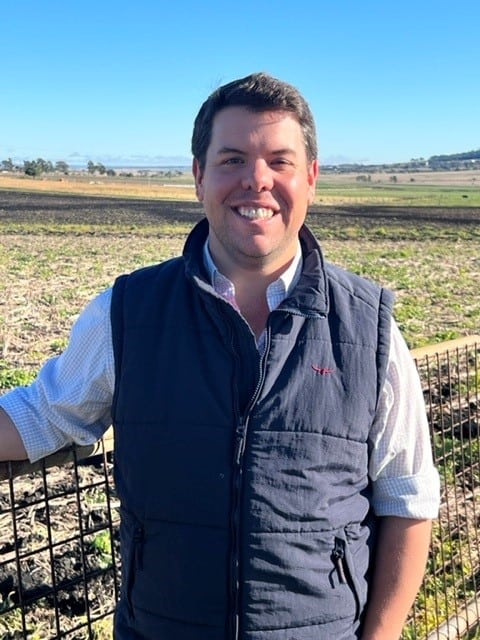
In a world increasingly focused on sustainable practices and environmental stewardship, few stand out in Australia’s viticulture industry like Dr Mary Retallack. As an Agroecologist, Viticulturist, Managing Director of the national EcoVineyard Program and Alumni of the Australian Rural Leadership Program (Course 15), Dr Retallack has covered some serious ground across her 30-year-career. For her work increasing biodiversity and soil remediation in vineyards across the country, she has recently been recognised on the South Australian Women’s Honour Roll – positioning her as one of the first women in the wine industry to be included on the list. In celebration of this achievement, ARLF sat down with Dr Retallack to discuss her multifaceted career and the legacy she hopes to leave behind for the next generation of growers.
Australian Rural Leadership Foundation: What inspired you to pursue a career in agroecology and viticulture? Can you share some key milestones in your 30-year journey?
Mary Retallack: I grew up on a fruit block in the Riverland, SA where we grew wine-, table- and drying grapes, apricots, and pears. I didn’t realise I could have a career in the wine community but knew I wanted to work outside. I was accepted into a conservation and park management degree at the age of 16 to train to become a park ranger. Armed with post graduate qualifications in Natural Resource Management I couldn’t get a job and ended up falling back into the wine sector as it was taking of in the mid 1990s. I have worked in a range of roles including educator, extension specialist, vineyard manager, research scientist, independent viticultural consultant, and agroecologist.
I managed a vineyard in my late 20s and intuitively applied my knowledge of ecology in that role, planting thousands of native insectary plants which provide habitat for predatory arthropods, which in turn contribute to biocontrol of a range of grapevine insect pests. When the vineyard changed hands, all the plants were sprayed out using chemicals. I was so grumpy, I decided to do a PhD to further demonstrate the benefits. This gave me the confidence to publish widely about agroecology in peer reviewed and grower focused journals and share these practical insights both nationally and internationally. It is now the focus of my work, to revolutionise the way we grow crops, food and fibre while tapping into the intelligence of nature to grow resilience in production systems and provide long term solutions.
Most of the recognition I have received has come from outside the wine community and internationally. Most of my satisfaction comes from empowering growers with the tools and confidence to grow resilience and profitability in their production systems and observing the lightbulb moment when each discovers how much it makes sense. Ecological practices are mutually beneficial to production systems. We work with growers from all walks of life and management preferences from conventional, minimal input, regenerative, organic, and biodynamic, we complement these practices by offering a range of ecological approaches that can be applied incrementally. We start small and then scaled up over a larger area as we observe what works well for a particular site.
ARLF: How does it feel to be one of the first women from the wine community to be included on the South Australian Women’s Honour Roll? What does this recognition mean to you personally and professionally?
MR: It is a real privilege and honour. It also provides a valuable platform to celebrate the contributions of many of my colleagues in the agriculture and wine communities. It would be of course even better if we didn’t need a specific focus on the achievements of women. However, female viticulturists make up 10% of the team and until we reach gender parity then it is an important way of demonstrating what is possible.
ARLF: Could you elaborate on the EcoVineyards program and its objectives? What are some of the innovative practices you’re implementing to grow wine grapes in harmony with nature?
MR: The national EcoVineyards program is being run in partnership between my company Retallack Viticulture Pty Ltd, Wine Australia and more than 140 different businesses, including 75 wine grape growers called EcoGrowers who demonstrate a range of ecological practices on their properties. Each contribute cash and/or in kind and are united by a common goal of practicing environmental stewardship.
The focus areas are soil health, ground covers (including cover crops and functional biodiversity, that is all the flora and fauna found in association including predatory arthropods (insects and spiders), microbats which can eat up to half their body weight in insects each night (and love eating moths and other grapevine insect pests), insectivorous and raptor birds of prey.
We also have a focus on planting native insectary plants as they are locally adapted, provide habitat for a range of predatory species and are not only contribute to a range of ecosystem services but also look great. It is a fantastic way to make sure our vineyards look uniquely Australian and to showcase our flora and stand out in a crowded international marketplace.
More than 90% of Australia’s flora and fauna is endemic and many of the predators we wish to attract have co-evolved with our native plants, this it makes sense to focus our efforts with locally adapted species that thrive in our warmer and drier climate.
We are working across nine wine growing regions nationally and have regional on-ground coordinators (ROCs) available to assist wine growers along with more than 1,000 pages of freely available resources in the EcoVineyards knowledge hub including fact sheets, grower profiles, grower insights, case studies and supporting information which can be accessed via the EcoVineyard website.
ARLF: What kind of interest have you observed in eco-friendly viticulture, both in Australia and internationally? How are you addressing this growing interest?
MR: We work from a position of generosity and kindness and find that if we share, we generate trust and a culture of reciprocity, everyone benefits. For example, we have good working relationships many international colleagues including Biodiversity Friend based in Italy, The Regenerative Viticulture Foundation based in the UK, and The Porto Protocol based in Portugal, Bragato Institute in NZ and this keeps growing as they can see the practical approach we are taking to promote participatory action learning amongst growers and EcoVineyards is widely regarded as being a world leading program.
ARLF: How do you see your ecological and regenerative practices influencing broader agricultural systems beyond viticulture?
MR: Absolutely, all the ecological practices that we share are applicable to a broad range of production systems including fruit, nut crops, broadacre, fibre and vegetables. We shot a segment for Gardening Australia this week and these practices have widespread appeal from the home gardener to large scale production enterprises, everything is scalable.

ARLF: Looking back on your time in ARLP Course 15, how has it influenced where you are now in your career?
MR: My ARLP experience expanded my networks across a range of sectors and nationally, equipped me with a toolbox of skills and gave me the confidence to try new things including starting my own business in 2019. It also taught me how to respond when things don’t go as expected and the challenges of leading when there are a diverse range of personalities, needs and expectations. Overall, it helped me become more resilient and understanding that everyone has a story and different values, and this informs who they are and how people respond in different situations. It is important to celebrate diversity and be open to different points of view.
ARLF: How has participating in Course 15 of the ARLP contributed to your professional development? Which tools and insights from the program have been most beneficial?
MR: Understanding personality types has been very useful and insightful as I have navigated a range of leadership positions and board roles. Having a broader understanding of roles, challenges and opportunities outside the wine sector has been valuable as has the network of alumni that are spread throughout Australia and the world, there is a generosity to share and support which is a valuable gift that keeps on giving!
ARLF: Can you share a specific instance where the ARLP experience helped you overcome a challenge or seize an opportunity?
MR: The ARLP gave me the confidence to start my own business and develop it in a way that has given me the professional freedom to explore the topics that are most important to me, I can be nimble in my approach and have control over the direction I wish to take. It really is satisfying to have the freedom to grow and pursue important projects as they arise.
ARLF: Since completing the ARLP program, what have been the most significant changes or developments in your career as an agroecologist and viticulturist?
MR: I completed the ARLP program in 2019 and started my own consultancy business the same year during the GFC and it has been going strong for the past 15 years. Initially, I focused on providing independent viticultural advice and expert witness reports. In the past decade I completed a PhD focusing on viticulture and ecology which added to my previous qualifications and transitioned to an agroecological focus. I founded and now run the national EcoVineyards program, as well as writing educational materials for growers on ways we can grow crops in harmony with nature.
ARLF: How have your experiences with ARLP and your work in sustainable viticulture contributed to changes or advancements in the wine industry?
MR: I talk about ecological or regenerative practices rather than sustainable, as to ‘sustain’ in my opinion is far too low a bar. The challenges we currently face is urgent and require broadscale changes in the way we think and respond. This entails moving from a monoculture – to a polyculture of thought and practice change. We promote living systems, 100% ground cover and functional root growth, 100% of the time and advocate for working smarter rather than harder and reducing chemical inputs wherever possible.
There is a groundswell of interest from Australian wine growers who are arguably leading the way internationally. We are actively influencing the practices of viticulturists who manage nearly 150,000 hectares of wine grapes and aim to grow resilience and functional biodiversity into these production systems and surrounding properties. This information is widely applicable to all production systems and has generated lots of interest internationally also. We are the first example of influencing ecological practice change at scale and have set up 75 demonstration sites across Australia. Growers are testing these principles and then advocating for accelerated practice change amongst the broader wine grower community.
It is truly an exciting time to be involved in agriculture, food, and fibre production, we are relearning how to grow nutrient dense food at scale in a way that regenerates each production system and marries this forgotten knowledge with technological advances to a new generation.
It is important to remember that technology provides a range of tools, but it is agroecology that provides the long-term answers we are seeking to combat climate change, sequester and more carbon in our soils via the liquid carbon pathway, rebuild the soil water sponge, and feed the world.
ARLF: What advice would you give to current or future ARLP participants based on your journey since completing the program?
MR: It is a unique opportunity, a lifechanging experience. Be open to immersing yourself in its learnings, opportunities, and challenges. Grow your network and contribute as much as you can. You will get back much more than you put in. It is a valuable and often uncomfortable experience, but well worth the commitment to personal growth. Many of the learnings become more relevant after the program as challenges and opportunities arise in the workplace and community.
ARLF: Looking ahead, what are your aspirations for the future of sustainable viticulture and your role in it?
MR: I am in a privileged position of having the knowledge, skills, and confidence to help lead in the farming revolution that is occurring now. I will continue to write materials and share practical insights to accelerate practice change. I can grow the EcoVineyards program internationally and also cross-sectorally. I am excited about the new collaborations that occur and the capacity to continue to challenge me intellectually while providing practical solutions for growers.
One of the things I learned from the ARLP is how to create luck which is preparation meeting opportunity. I have spent my career preparing, so I am ready to seize opportunities as they arise. Also, the more you learn the more you realise you don’t know. But nature has the answers and through observation and an openness to trial different techniques we are learning better ways to farm while nourishing ourselves. We are of course nature and what we do to nature we do to ourselves!
ARLF: What advice would you give to women aspiring to leadership roles in agroecology, viticulture, or related fields?
MR: Put your hand up for opportunities and make your own luck. Don’t wait for someone to create a path for you, you may need to create your own. Surround yourself with people who will support and challenge you in a safe environment and most of all, back yourself. We need more women contributing sooner, this may be at the decision-making table or as I have learned from behind the scenes using less traditional means and pathways.
It is possible to be the catalyst for positive change on your own terms and create new ways of doing things. Being a disruptor can be challenging but also fun and it can be done while maintaining your own set of values. Kindness and generosity go a long way and create the kind of culture I am interested in fostering. You will find your tribe, but it may take a while.
Mentoring is important but finding sponsors who can open doors is also important. Develop your networks and then put them to good use. Most of all be kind to yourself, set boundaries. It is ok to say no to opportunities if they take you away from your goals, consider each in this context and make time for the fun stuff and self-care. That is one of the important lessons I have learned in the last decade. Invest in yourself and don’t be afraid to put your own needs first so you don’t burn out. Be grounded in nature and take time to observe and be awestruck by its complexity and beauty.
ARLF: What are some of the lesser-known innovations or challenges in the wine industry that the general public might not be aware of?
MR: Wine grape growers are lending the way internationally with their approach to ecologically based farming practices, by objectively assessing plant health via leaf brix, growing a diversity of supplementary flora which increases the functional biodiversity of vineyards, focusing on the microbiology and living elements of the soil to maximise soil health, water infiltration, growing soil carbon, covering bare earth, and understanding the connections not only between soil and plant health, plants and the predators found in association. Biodiversity is the community of flora and fauna, and each plays an important part in the functioning of the agroecological system and its long-term resilience and profitability.
ARLF: Could you shed light on how sustainability practices are changing the face of winemaking and what this means for the future of the industry?
MR: There is a much greater understanding about the soil microbiome and capacity to influence vine health and the nutrient density of wine grapes, flavour profiles and potentially fruit quality. We have the capacity to produce grapevines that are healthier and less likely to be subject to insect attack and fungal pathogens, again resulting in better fruit quality and capacity to buffer production. Wine growers are working smarter rather than harder and are looking for longer term solutions to conserve water use, reduce chemical and synthetic fertiliser inputs which often have unintended consequences.
ARLF: Can you discuss the role and importance of leadership within the wine industry, particularly in the context of sustainable practices and innovation? How has your leadership journey influenced your approach to challenges in the industry?
MR: Yes, there are growers in distress in some regions that are no longer able to find a market for certain varieties. This provides a great opportunity to diversify into cash crops in the midrow of vineyards that are not currently producing a crop, i.e. botanicals for gin production or native grasses and forb seed. It is also a great opportunity to try new inexpensive techniques to move away from bare soil and start regenerating soil health. Once the system starts to self-heal there are many benefits that follow including the capacity of the land to produce high quality crops more consistently with less intervention and a higher profit margin. It may take new thinking and a change in culture, but the potential benefits are significant and long lasting.
ARLF: Finally, what legacy do you hope to leave in your field, and what impact do you wish to have on the next generation of agroecologists and viticulturists?
MR: To contribute to the revolution of how we grow crops in harmony with nature, to grow nutrient dense produce in a way that nourishes the environment and us. To create a resilient, profitable, and self-sustaining agricultural communities that can lead the way in mitigating the effects of climate change, create living soils and regenerate healthy farming systems and communities. There is a better way to farm and an urgency to tackle the current challenges head on. There is no time to waste, our collective hopes and that of future generations depend on it!
Mary’s story is one chapter of a larger narrative of ARLP change-makers and visionaries who are helping to reshape our rural, regional and remote communities.
Find out more about the ARLP or register your interest for future programs visit our website.








